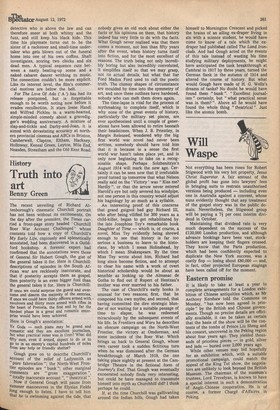History
Truth into art
Benny Green
The recent unveiling of Richard Attenborough's cinematic Churchill portrait has not been without its excitements. On the day after the premiere, the Times carried a front-page story headed 'Churchill Boer War Account Challenged' whose contents told how a copy of Churchill's My Early Life, copiously and splenetically annotated, had been discovered in a Guildford bookshop. A forensic expert had confirmed that the annotations were those of General Sir Hubert Gough, the gist of the general takes it for. Here is Churchill: descriptions of episodes in the South African war are recklessly inaccurate, and that if posterity accepts them as gospel, then posterity is an even bigger fool than the general takes it for. Here is Churchill: If once we could surprise the guard and overcome and disarm the majority of the sentries, if once we could have thirty officers armed with revolvers and thirty more armed with rifles in the heart of Pretoria, the first and by far the hardest phase in a great and romantic enterprise would have been achieved.
Here is Gough's annotation:
Ye Gods — such plans may be grand and romantic and they are excellent journalism, but what practical sense was in them? What did fifty men, even if armed, expect to do or to go to in an enemy's capital hundreds of miles from any help or friendly shelter?
Gough goes on to describe Churchill's account of the relief of Ladysmith as
pure fabrication "; the North-West Frontier episodes are "bunk "; other marginal comments are "gross exaggeration " totally inaccurate account ", " theatrical ". Now if General Gough will pause from summer manoeuvres in the Elysian Fields long enough to listen, I have to tell him that he is swimming against the tide, that nobody gives an old sock about either the facts or his opinionson them, that history indeed has very little to do with the facts. What Gough never realised was that there comes a moment, not less than fifty years after the event, when history turns itself into fiction, and for the most excellent of reasons. The truth being not only incredibly boring but also incredibly convoluted, it simplifies itself so that we may grasp, not its actual details, but what that liar Ford Madox Ford used to call the poetic truth. The clumsy shapes of circumstance are moulded by time into the symmetry of art, and once these outlines have hardened, nobody who can melt them down again.
The time-lapse is vital for the process of mythmaking to complete itself, which is why none of the great events of history, particularly the military set pieces, are ever apotheosised until a couple of generations have been allowed to retire beneath their headstones. When J. B. Priestley, in Margin Released, wondered why the big first world war novel had never been written, somebody should have told him that it is because in a sense the first world war hasn't taken place yet, and is only now beginning to take on a recognisable shape. Perhaps Solzhenitzyn's August 1914 will mark the new age. Certainly it can be seen now that if irrefutable proof turned up tomorrow that what 'Nelson really said on the 'Victory' was "Kiss me? Hardly ", or that the arrow never entered Harold's eye but only severed his windpipe, not one person in this country would adjust his hagiology by so much as a syllable.
An interesting proof of this concerns that grand guignol bad guy Richard III, who after being vilified for 300 years as a child-killer, began to get rehabilitated by the late Josephine Tey's remarkable book Daughter of Time — which is, of course, a novel, Miss Tey evidently being shrewd enough to see that history is far too serious a business to leave to the historians, by which I mean Holinshead, by which I mean Shakespeare. By the time Miss Tey wrote about him, Richard had• long since become fiction, and to attempt to clear his name with a work of overt historical scholarship would be about as sensible as looking up the Almanac de Gotha to find out if Rupert of Hentzau's mother was ever married to his father.
The case of Churchill's early books is unusual for two reasons; first, that he composed his own myths; and second, that having committed the dire strategic blunder of not waiting for a suitable passage of time to elapse, he was redeemed miraculously by the subsequent events of his life. In Frontiers and Wars he describes an obscure campaign on the North-West Frontier, the victory at Omdurman, and some incidents of the Boer War. Which brings us back to General Gough, whose own career took a sudden fictitious turn when he was dismissed after the German breakthrough of March 1918, the one taking place nightly at present at the Cambridge Theatre in the fictional form of Journey's End. That *Gough was eventually exonerated nobody finds very interesting, but could he have managed to transmute himself into myth as Churchhill did? I think perhaps he could.
If, at the time Churchill was gallivanting around the Indian hills, Gough had taken himself to Mornington Crescent and picked the brains of an ailing ex-draper living in sin with a science student, he would have come to know of a tale which the exdraper had published called The Land Ironclads. And had Gough acted on the events of this tale instead of wasting his time studying military deployments, he might have anticipated the tank breakthrough at Cambrai in 1917 by three years, turned the German flank in the autumn of 1914 and altered the course of history. But what would Gough have made of H. G. Wells's dreams of tanks? No doubt he would have found them "bunk ". "Excellent journalism " certainly, but "what practical sense was in them? ". Above all he would have found the whole thing "theatrical ". Just like the atomic bomb.


























 Previous page
Previous page